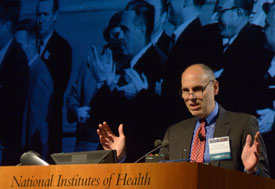NIH's NICHD celebrates 50 years of improving children's health
January / February 2013 | Volume 12, Issue 1
From discoveries that prevent the transmission of HIV from mother to child, to vaccines that protect children from deadly diseases, the Eunice Kennedy Shriver National Institute of Child Health and Human Development (NICHD) has contributed to nearly every major advance in children's health since 1962. The Institute recently marked these achievements with a symposium titled, "Research for a Lifetime."
"Because of NICHD, it's fair to say, many of the accomplishments of the last 50 years have become possible," said NIH Director Dr. Francis S. Collins. "NICHD has been in the middle of those advances, not as an observer but as a central participant. It has not only been reading the story, but has been writing it."
In a brochure produced for the anniversary, NICHD Director Dr. Alan E. Guttmacher acknowledged that scientific progress is incremental, with collaboration playing a vital role in achieving breakthroughs. "As we look back over the last five decades, we recognize the research challenges that gave way to research advances. We highlight not only the big steps forward, but also the small steps that made those advances possible."

Photo courtesy of NIH
Hailing 50 years of scientific discoveries,
National Institute of Child Health and Human
Development Director Dr. Alan E. Guttmacher
says he also sees promising research
opportunities ahead.
Many of the achievements have had an enormous impact worldwide, contributing to a more than 50 percent drop in the global infant mortality rate since 1960. Mother-to-child transmission of HIV - once prevalent in the developing world - has fallen below 10 percent in Asia and Africa, thanks to the discovery of effective treatments and safe breastfeeding practices. Meanwhile, the inexpensive drug misoprostol provides a safe and convenient way to prevent postpartum hemorrhage, a major killer of women in developing countries. A global campaign, Helping Babies Breathe, is teaching midwives and birth attendants in poor countries how to spur newborns to take their first breaths. Today, screening tests can quickly detect a number of congenital diseases in infants, speeding treatment.
The commemorative event also included a presentation by Dr. Duane Alexander, who served as NICHD director from 1986 to 2009. Alexander detailed examples of the Institute's contributions to improving the health and well-being of children and families in the U.S. and around the world (see chart below, Advancing child health science globally). For instance, vaccine advances have played an essential role in protecting children from devastating diseases, he noted. NICHD-supported scientists helped develop a vaccine against Haemophilus influenzae type b - a disease that can cause meningitis, resulting in permanent deafness, brain damage or death. "Eliminating this disease is one of the NIH's all-time major contributions to public health," Alexander said.
Advancing child health science globally
Key advances relevant to global health supported by the National Institute of Child Health and Human Development (NICHD) include:
- Improving management of pregnancy problems such as hemorrhaging, diabetes, preeclampsia and preterm labor
- Discovering better interventions - such as resuscitation methods, intravenous fluids and special nutrition - that improve newborn survival
- Developing infant screening for nearly 30 diseases
- Expanding the types of vaccines available to protect children from debilitating or fatal infections
- Determining and promoting the safest sleeping positions for babies
- Producing more effective contraceptives
- Advancing infertility diagnostics and treatments
- Showing the benefits of mainstreaming children with certain disabilities
- Developing techniques to teach reading to disabled children
For a more extensive list of NICHD accomplishments, read the article Why Should There Be an NICHD? from the February 2011 issue of Pediatrics.
The future looks bright for more groundbreaking research, Collins predicted. "The science that NIH has the potential to support right now across the board - but particularly in the areas that NICHD has responsibility for - has never been more exciting, more full of promise. Whether we're talking about the basic science of human development or the much more applied research and translation that includes not only children's health but also women's health and rehabilitation, the opportunities now are breathtaking."
During the anniversary celebrations, the institute unveiled its scientific vision for the next decade, mapping out specific goals by category. "We are entering a new and promising era in biomedical research," noted Guttmacher. "In the next decade, we must be ambitious and choose research questions not because they are the easiest to answer, but because they are the most important."
NICHD's Office of Global Health
The NICHD Office of Global Health facilitates international research and coordinates the HIV/AIDS portfolio at the NICHD. The OGH seeks to improve overall health worldwide by providing leadership, coordination and support for NICHD’s global heath mission and activities.
More Information
To view Adobe PDF files,
download current, free accessible plug-ins from Adobe's website.